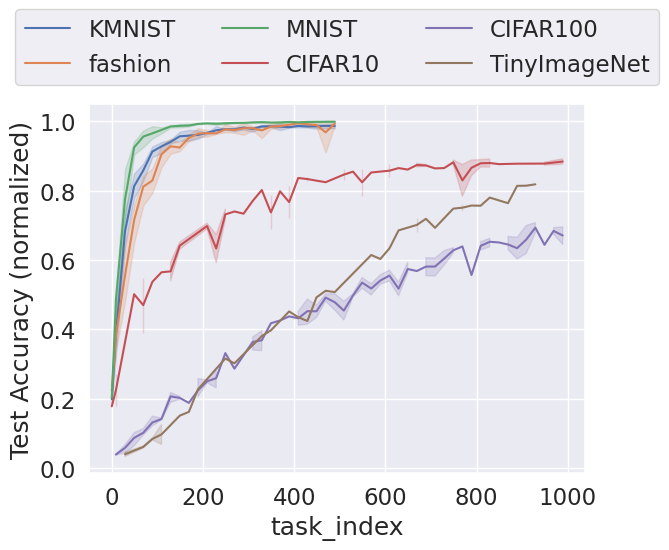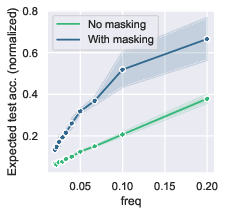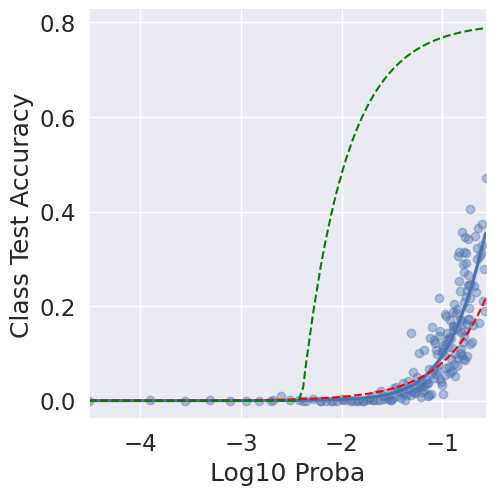Official Code for "Challenging Common Assumptions about Catastrophic Forgetting and Knowledge Accumulation", CoLLas 2023
Building learning agents that can progressively learn and accumulate knowledge is the core goal of the continual learning (CL) research field. Unfortunately, training a model on new data usually compromises the performance on past data. In the CL literature, this effect is referred to as catastrophic forgetting (CF). CF has been largely studied, and a plethora of methods have been proposed to address it on short sequences of non-overlapping tasks. In such setups, CF always leads to a quick and significant drop in performance in past tasks. Nevertheless, despite CF, recent work showed that SGD training on linear models accumulates knowledge in a CL regression setup. This phenomenon becomes especially visible when tasks reoccur. We might then wonder if DNNs trained with SGD or any standard gradient-based optimization accumulate knowledge in such a way. Such phenomena would have interesting consequences for applying DNNs to real continual scenarios. Indeed, standard gradient-based optimization methods are significantly less computationally expensive than existing CL algorithms. In this paper, we study the progressive knowledge accumulation (KA) in DNNs trained with gradient-based algorithms in long sequences of tasks with data re-occurrence. We propose a new framework, SCoLe (Scaling Continual Learning), to investigate KA and discover that catastrophic forgetting has a limited effect on DNNs trained with SGD. When trained on long sequences with data sparsely re-occurring, the overall accuracy improves, which might be counter-intuitive given the CF phenomenon. We empirically investigate KA in DNNs under various data occurrence frequencies and propose simple and scalable strategies to increase knowledge accumulation in DNNs.
The main contribution of this work is to show precisely that the effect of catastrophic forgetting is limited on deep neural networks (DNNs) and that it does not prevent knowledge accumulation. Secondly, it proposes an evaluation framework (SCoLe) to study the knowledge accumulation in DNNs at scale.
We hope that this benchmark will help to design continual algorithms that could be efficient and deployable.
SCoLe (Scaling Continual Learning) is a continual learning framework for generating long sequences of tasks with various frequencies of tasks and classes. It is made to study the knowledge accumulation capability of learning algorithms. The scenario is generated from a fixed dataset, then each task is generated online by randomly selecting a subset of classes or data point.
By training and long sequences of automatically generated tasks, we can visualize progress (knowledge accumulation) by plotting the evaluation of accuracy on the test set composed of all classes.
In the paper, we show that knowledge accumulation consistently happens on various datasets and architectures which means that catastrophic forgetting is consistently limited in its effect on the whole model.
To analyse further, we can control the probability of sampling classes to control their frequency of appearance in the sequence of tasks. As such we can visualize knowledge accumulation with respect to classes' frequency of appearances:
When all classes are sampled with the same frequency (balanced distribution):
or when all classes are sampled with different distributions:
The influence of various design choices, such as hyper-parameters, can then be evaluated to know which composition leads to the best knowledge accumulation.
pip install -r requirement.txtHere is some example of runs to play with the code base. If you are looking for the exact configuration to reproduce one figure of the paper do not hesitate to contact us.
One run with MNIST, 2 classes per task, 1 epoch per task,500 tasks using group masking on Adam optimization. (estimated duration ~20mins)
python main.py --wandb_api_key $YOUR_WANDB_API_KEY --classes_per_task=2 --dataset=MNIST --masking=group --momentum=0 --nb_epochs=1 --classes_per_task=2 --num_classes=10 --num_tasks=500 --optim=AdamOne run with 100 classes of TinyImagenet with random perturbation (severity 1), imbalanced class distribution by factor 2 (param: entropy_decrease), 1 epoch per task, 10 classes per task, 2500 tasks using group masking on SGD optimization and no momentum. (estimated duration ~15hrs)
python main.py --wandb_api_key $YOUR_WANDB_API_KEY --class_acc=True --classes_per_task=10 --dataset=Tiny --entropy_decrease=2 --lr=0.01 --masking=group --momentum=0 --nb_epochs=1 --num_classes=100 --num_tasks=2500 --optim=SGD --rand_transform=perturbations --severity=1One run with CIFAR100 dataset with wide resnet with growth factor 2 (use the pretrained_model parameter together with reinit_model):
python main.py --wandb_api_key $YOUR_WANDB_API_KEY --classes_per_task 2 --dataset CIFAR100 --masking group --momentum 0 --nb_epochs 1 --pretrained_model wrn --wrn_width_factor 2 --classes_per_task 2 --num_classes 10 --num_tasks 500 --optim Adam --reinit_model 1Same as above with frequency replay (by default frequency replay classes between frequency low_frequency=0.01 and high_frequency=0.1 ) (estimated duration ~16hrs)
python main.py --wandb_api_key $YOUR_WANDB_API_KEY --class_acc=True --classes_per_task=10 --dataset=Tiny --entropy_decrease=2 --lr=0.01 --masking=group --momentum=0 --nb_epochs=1 --num_classes=100 --num_tasks=2500 --optim=SGD --rand_transform=perturbations --replay=frequency --severity=1@misc{Lesort2023Challenging,
title = "{Challenging Common Assumptions about Catastrophic Forgetting and Knowledge Accumulation}",
author={{Lesort}, Timoth{\'e}e and {Ostapenko}, Oleksiy and {Rodr{\'\i}guez}, Pau and {Misra}, Diganta and {Rifat Arefin}, Md and {Charlin}, Laurent and {Rish}, Irina},
booktitle={Conference on Lifelong Learning Agents},
year={2023},
organization={PMLR}
}



